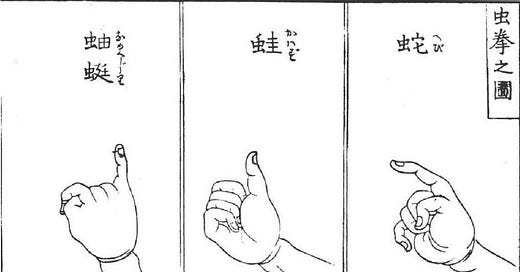The Neat History of Rock, Paper, Scissors – Mushi-ken (虫拳)
A historical insight into gaming and Slug, Frog, Snake (Japanese rock, paper, scissors)
Earliest Japanese form of Rock, Paper, Scissors: Mushi-ken, (1809). From left to right: Slug (Namekuji), Frog (Kawazu), and Snake (Hebi).
I listened to a fascinating talk the other night about the history of gaming by John Bucher. He told some fascinating tales about why games have been a part of human life for thousands of years.
Explored how they evolved, and also talked about the cute playground game Rock, Paper, Scissors – how it evolved from hand gestures on an Egyptian wall, to a similar game with three hand gestures played in China, around 200 BCE.
Mushi-ken
The earliest record in Japan is a similar game to that in China, but its earliest name in Japan was Mushi-ken. Unlike the Rock, Paper, Scissors we know, the Japanese used different figures. That of the Frog, Slug and Snake – this tickled me to know that these were the three figures represented.
How to play the mushi-ken game is that the Frog is represented by the thumb, the Snake by the index finger, and the Slug by the little finger. Then to know that the Frog beats the Snake, the Slug beats the Frog, and Snake beats the Slug.
And the Japanese folk tale behind those three characters, and why it might boggle your mind to know that the frog beats the snake – was one characteristically dark of Japanese folklore.
The Myths Behind Ancient Games
Screenshot from John Bucher’s presentation.
The name of the talk I watched was The Myths Behind Ancient Games and you should be able to spot the link to a video recording of it in a few days, if you’re interested. Briefly though what interested me was how gaming was seen in ancient Egypt, as a way to pass through challenges, that they saw as a representation of the journey that they take to the underworld.
I thought that was a fascinating concept that board games were interlinked with how Egyptians viewed death. Much like their mummification process was a way to bring them through the afterlife (which in some senses it did, as we unearth them now). But perhaps they had insanely good foresight to know that gaming would continue to challenge humans in the millennia to come.
Although what we view as gaming now, is far beyond sticks, stones, paper and scissors.
Modern Games
What fascinates me about modern games is that while they’re no longer (or rarely) played face to face anymore. They still allow players to level the societal playing field (mostly), and challenge individuals on their speed, cunning, and logical reasoning. It still unites people from far further together to fight something or figure out a puzzle.
While some games have lost that sense of challenge, they now take on a new form too. An escape from current reality. You have farm simulators, cute cozy games, funny ones. I wonder where gaming will go in the next ten years, will humans crave more challenge in gaming or less? Will they become more divided as they sit in their rooms, or ever more connected. Will virtual reality continue into holographic games or will humans leave it behind in favour of more real life experiences.
Will people opt to move over to an actual farm and grow real crops? I have no idea, this is all me speculating. I imagine what will happen is there will be an abundance of mundane AI games, but that there will be small independent game creators who will uprise and outshine them all. Let me know what you think.
Also have fun playing Frog, Slug and Snake — it’s hard to wrap your brain around at first but its fun to play a game that others played thousands of years ago.





